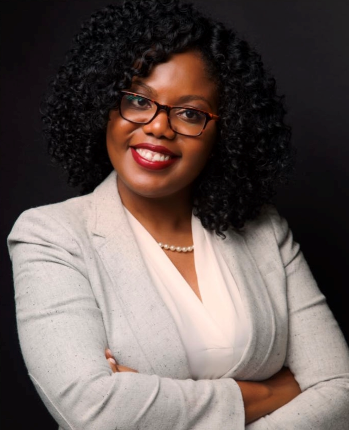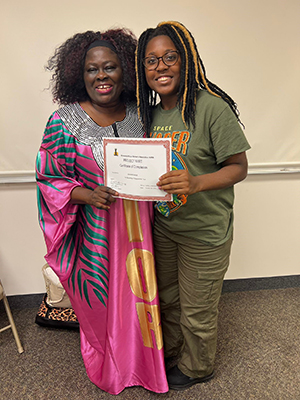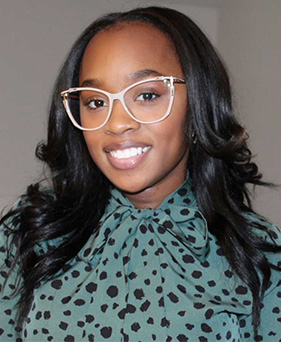Health Equity Division Newsletter - May 2024

In this newsletter:
Greetings from the Health Equity Strategy and Innovation Division
Message from the Director
CONNECT: Grantee Spotlight: MAWA
STRENGTHEN: Disabilities in Southeastern Minnesota: identifying needs within the Latino communities.
AMPLIFY: Office of African American Health
Greetings from the Health Equity Strategy and Innovation Division

Welcome spring! At its core, spring represents renewal, rebirth, and the cyclical nature of life. Following months of cold weather and dormancy, spring ushers in a period of new growth and vitality. We hope this is a time of renewal, strength and opportunity for you and your loved ones.
As noted in the last newsletter, we have welcomed new members to both the Health Equity Advisory and Leadership (HEAL) Council, which supports MDH in advancing equity in its programs and policies, and the Community Solutions Advisory Council, which advises on the health equity division's Community Solutions for Healthy Child Development grant program. In an upcoming newsletter, we will introduce you to council members and hear about the equity work they are excited to move forward with MDH.
[Interested in being a guest writer for a future newsletter? Email your idea to health.equity@state.mn.us and we will be in touch!]

Message from the director
Spring marks a time for transformation for the Health Equity Strategy and Innovation Division. Since becoming director, I have seen the value of partnerships soar to new heights and lead to new horizons. I am proud of key internal partnerships, like our collaboration with our health equity bureau colleagues to provide new or continued funding to over 150 community partners.
In this edition we introduce you to DaVonna Rucker, who is leading the Office of African American Health (OAAH). We also shine a spotlight on the incredible work of the Minnesota African Women’s Association (MAWA), and later on the tremendous efforts of Hispanic Advocacy and Community Empowerment Through Research (HACER) and Southeastern Minnesota Center for Independent Living (SEMCIL). We continue to strengthen partnerships across our agency in many ways, such as informing our strategic plan through community engagement and accountability. Another key example of this is our health equity strategists, who are embedded within divisions to make sure equity is operationalized over time.
Of course, I would not be able to do this work alone and am grateful to have resilient leaders by my side as we work to provide strategies for this anti-racism focused work, that centers the voices of marginalized populations and foster a sense of belonging. I would like to extend my congratulations to Kris Rhodes, the director of the Office of American Indian Health, who celebrated the launch of her team. I would also like to show my appreciation for Scottie Carter, director of the Office of Diversity, Equity, Inclusion and Belonging as he continues to provide brave spaces for thoughtful conversations.
Odichinma (Odi) Akosionu-DeSouza (she/her)
Division Director
CONNECT
[We are a network hub – leading, connecting and strengthening networks of health equity leaders and partners across MDH and Minnesota communities.]

Grantee Spotlight: MAWA
The Minnesota African Women’s Association (MAWA), was founded in March 2002 by its current executive director, Melissa Nambangi. MAWA promotes the health and well-being of African refugee and immigrant women and their families in the Twin Cities area through research, education, advocacy, and programming. For over a decade, the community expressed deep concerns on the high rates of unintended teen pregnancies among Africans living in Northwest (NW) Hennepin County. The impacts were devastating for pregnant teens leading to high rates of school dropouts, having limited pathways to higher education, and experiencing family rejection and homelessness due to cultural taboos surrounding pregnancy outside of marriage.
The African Girls Initiative for Leadership & Empowerment (AGILE) program was designed for girls ages 9 through 18 with a focus on building self-esteem, reducing isolation, discovering new friends, and lessening the impacts of negative peer pressure through the evidence-based curriculum, BART (Becoming A Responsible Teen). To strengthen cultural pride and understanding, Nambangi and community members wove culturally relevant messages into all aspects of the program with AGILE's motto being, "Building on our African past for a successful American present and future."
As interest in MAWA’s programs grew, so did the need for increased support. Parents and advisory members communicated they wanted the boys to learn everything the girls were learning. “They needed more than soccer,” Nambangi shared with a laugh. It became clear that African boys needed to understand and engage in teen pregnancy and HIV prevention efforts.
Around this time, Nambangi was an awardee of MDH’s Eliminating Health Disparities Initiative (EHDI). The grant helped MAWA to expand, including programming for boys, ongoing conversations with parents, and the ability to bring programs to African young people outside of NW Hennepin County. Teen boys were taking part in the BART program and becoming peer leaders in their schools and communities. The AGILE program was enhanced to include more focus on college attendance, financial literacy, reproductive health education, civic engagement, and environmental justice, and as a result many AGILE graduates now hold bachelor and graduate degrees. As stated by MAWA participants, “Being in MAWA made my life today possible.”
Furthermore, Nambangi noticed the reduction in teen pregnancy rates for African youth in NW Hennepin County, and views MAWA as an important contribution to this reduction. Now, 22-years strong, I asked Nambangi what drives her to continue this valuable and intensive work. She responded, “Young people deserve information to protect themselves and their futures. The satisfaction of seeing a young person excel when they’re provided the opportunities ... I consider this a blessing.”
STRENGTHEN
[We provide leadership in advancing health equity and cultivate health equity leaders within MDH and across Minnesota communities.]
Disabilities in Southern Minnesota: identifying needs within the Latino communities
![]()
This guest article comes from Rodolfo Gutierrez, Hispanic Advocacy and Community Empowerment Through Research (HACER) and Rosalie Eisenreich, Southeastern Minnesota Center for Independent Living, Inc. (SEMCIL).
Hispanic Advocacy and Community Empowerment Through Research (HACER) engages Latino Minnesotans through research, evaluation, and community action to promote equitable representation at all levels of institutional decisions and policy change.
Latinos with disabilities, aging-related conditions, or chronic health conditions have been overlooked in data, research, and the development of programming to support their unique needs for access and belonging. This population faces unique barriers which needs to be taken into consideration when allocating resources to support Latinos with disabilities in Southern Minnesota. “They’re just not people, they’re not whole people. I imagine they’re missing something,” remarked a parent of a child with disabilities.
Therefore, Southeastern Minnesota Center for Independent Living, Inc. (SEMCIL), partnered with HACER to conduct a qualitative research project to collaboratively engage and support the Latino community with disabilities in this area. The aim was to identify and learn about how the community defines disability, and the challenges and barriers to achieve more independent living. “I believe it is something familial, right? When there's someone with a disability in a household, it doesn't just involve the parents anymore; it involves the siblings, probably the aunts and uncles, the cousins,” commented a study participant.
The study found that disabilities were seen as impactful, affecting mental health, and creating emotional and financial challenges. Immigration status and language barriers also complicated access to resources and services. Hurtful comments and discrimination from others were reported, contributing to feelings of isolation. Nicknames were sometimes given to those with a disability that are intentionally or unintentionally harmful. However, participants suggested there was some improvement in the Latino community's acceptance of disabilities. Family and community support were crucial, with trusted individuals playing key roles in connecting participants to resources. The study highlighted the need for culturally relevant and accessible services, focusing greatly on trust and understanding of language and culture.
To enhance accessibility to disability services within these communities, it is important to adopt comprehensive strategies like producing translated materials, offering culturally relevant programs, organizing community outreach events, and collaborating with local leaders and organizations. By implementing these recommendations, we aim to support SEMCIL's mission of expanding service accessibility for the Latino community. It is our hope that this study will support SEMCIL's efforts in creating a more inclusive and supportive environment for individuals with disabilities and their families.
AMPLIFY
[We amplify the work of communities most impacted by health inequities and support them to drive their own solutions.]
Office of African American Health

The newly established OAAH is dedicated to addressing the root causes of health disparities that disproportionately impact Minnesota’s African American communities, specifically multigenerational African Americans, or American Descendants of Slaves, as well as convening an African American Health State Advisory Council. The office will carry out this mission by focusing on health care quality and access, education quality and access, economic stability, social and community context related to inclusion and representation in society, and neighborhood and built environment. Strategies include collaborating with communities to advance existing efforts and engagement in community violence and criminal justice prevention work. Furthermore, the African American Health Special Emphasis Grant Program will administer grants to community-based organizations working with the multigenerational African American community to improve health outcomes. “I am honored to lead the work of this office. It is bold. It is explicit. It is intentional and necessary to amplify the needs of the Black community. The symbolism of the Office of African American Health is historic and monumental for our society,” rejoiced DaVonna Rucker, the director of OAAH.
DaVonna Rucker has had a comprehensive career in equity advancement in the educational, criminal justice, and nonprofit spaces. Her career focus for the last decade-plus has been to increase advancement opportunities and overall wellness for Black and other disenfranchised groups in the Twin Cities.
We appreciate all of your contributions to our newsletter - we continue to be inspired by the incredible work you all are doing! This concludes our first newsletter as the Health Equity Strategy and Innovation Division. Thank you for the continued support and guidance as we work together to create a system that better serves our communities who have experienced inequities. We look forward to sharing more about our collaboration with internal and external partners in upcoming newsletters!